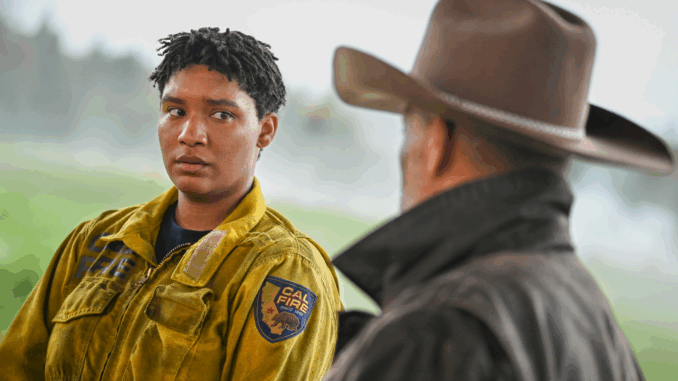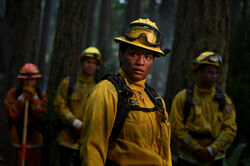
More Than the Muscle
Eve Edwards, played with quiet power by Jules Latimer, has long been Fire Country’s emotional center of gravity. A calm, commanding firefighter, she’s the one people run to in crisis. But what happens when the person who keeps others afloat begins to drown in silence?
Eve’s journey is not as showy as Bode’s or as tragic as Sharon’s—but it may be the most relatable. She is the high-performing woman who never complains, the loyal friend who carries everyone’s burdens, and the leader who never lets herself break.
Until now.
The Burden of Being the Strong One
Since Season 1, Eve has carried a crushing amount of responsibility. As one of the few women on the fireline, and one of even fewer LGBTQ+ characters on broadcast television, she has always walked the edge of representation and realism.
Her strength isn’t just physical—it’s emotional. When Bode spirals, Eve pulls him back. When Manny falls apart, Eve steps in. She trains the rookies, runs drills, and rarely, if ever, shows weakness.
But cracks began to show in Season 3. A missed radio call. A failed save during a flashover. Panic attacks behind closed doors.
“You keep telling me I’m the rock,” she says to Sharon in a rare moment of vulnerability. “But rocks break too.”
Survivor’s Guilt and Hidden Trauma

One of Eve’s most defining backstories involves a fellow firefighter who died during a rescue mission she led. Though she was never blamed, the weight of that loss lingers.
In Season 4, Fire Country leans hard into this arc. Eve begins to relive the trauma in dreams, in hesitations, in moments where her leadership falters.
One episode focuses entirely on a training session gone wrong—where Eve must face a scenario eerily similar to her past loss. The result is a stunning, wordless breakdown in the middle of a burn simulation.
Therapy, Resistance, and Opening the Vault
For a woman who always leads from the front, seeking therapy feels like defeat. But Sharon, having faced her own emotional reckoning, pushes Eve toward healing.
Their scenes together form one of the most powerful female mentorship arcs on network TV:
-
Eve resists. “I don’t need someone in a chair telling me how I feel.”
-
Sharon waits. Then shares her own therapy journey. Quietly. Without pressure.
-
Eve shows up to the session—not to talk, but to sit in silence.
It’s the beginning.
Leadership Through Honesty
When Vince dies, a power vacuum threatens the cohesion of Station 42. The natural assumption is that Eve will step in. But she hesitates.
Instead of rushing to wear the badge, she asks for time, then builds her leadership from a place of honesty. In one team meeting, she says:
“I don’t have all the answers. I’m not perfect. But I care. And I’ll show up for every one of you.”
The crew—especially the rookies—respond not with applause, but with trust. And that trust becomes the foundation for a new kind of leadership.
A Character for the Present Moment
Eve Edwards is the kind of character who changes what TV looks like. A queer Black woman leading wildfire crews with integrity, pain, and strength—without being reduced to stereotypes or side plots.
Her Season 4 arc shows that you don’t have to be broken to be brave, and you don’t have to collapse to need help.
She is not the loudest fire in Fire Country—but she might be the most enduring.
